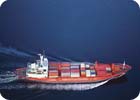Solutions: RFID Is What May Float the Boat

Homeland security, other government and military agencies as well as private security now cooperate in port protection as well as development of cargo container tracking, according to Coast Guard Captain Richard Kaser.
In waterways that stretch from Port Arthur, Texas to the east and Corpus Christi, Texas to the south, Coast Guard Captain Richard Kaser, commander of the Houston and Galveston region, has to monitor the largest domestic shipping operation in the United States.
Some Texas industry experts estimate that nearly 90 percent of the world’s most poisonous chemicals are manufactured in the region. Companies such as Valero, Dow Chemical and Shell Oil are but a few of the 150 major corporations who have built major manufacturing facilities in the region that then ship their goods to their worldwide customers.
With more than 750 ships daily transiting the Houston ports, business analysts note that an attack on any of these Texas-based business operations could tremendously impact the American 9.1 trillion dollar shipping industry.
Public, private cooperation
Kaser is quick to point out that securing the region takes the cooperative effort of the local, state and federal government agencies along with the Houston business community. He adds the shipping community had worked cooperatively before 9/11, but the terrorist attack has helped increase the focus.“What makes security work here is the cooperative efforts of everyone here,” said Kaser about how his Texas-based Coast Guard staff works with the petrochemical and shipping industry. “We have a good working relationship at all levels.”
The Coast Guard senior officer added real world emergencies such as the evacuation of ships and personnel from Port Arthur during Hurricane Rita helped to increase cooperation among Department of Homeland Security professionals, state officials, local leaders and private industry.
“When we had to escort every ship as the result of moving to condition orange, none of our ships were delayed in getting to port,” he said.
Still, an attack against the American shipping industry in a port like Houston would impact the American economy projected annually at over 9 trillion dollars. Some security experts argue that more needs to be done to protect American ports.
“A business can rent a ship-going trailer for three to five thousand dollars, but will spent only 50 cents to secure it,” said Joe McGrath, president and chief executive officer of Unisys, during a speech given to the World Congress of Information Technology, May 6 in Austin, Texas.
Container tracking
McGrath wants the American shipping community to adopt mandatory radio frequency identification or RFID transmission on each container to allow security professionals to track the departure and arrival of all goods into any American or international port.Unisys is currently working with the U.S. Army to track the shipment of military goods between North America ports and overseas locations.
“We made significant progress since Desert Storm in terms of asset visibility and the need for a policy regarding technology,” said Kevin Carroll, the Army’s program manager for Enterprise Information Systems.
The program allows the Army to monitor the shipment of any container with the help of four servers located in the U.S., Korea, Germany and Kuwait. Optical scanners can read the RFID containers at any port or from a satellite uplink.
Jim Lowder, vice president of engineering and the chief technology officer of MDI Security Systems, said the cost to update to a better RFID standard would cost much more than the current system, depending on the requirements.
“The containers would need Global Positioning Satellites if you wanted to track them at any point on the globe,” he said. “Another alternative is to have a standard reader at each port that would read the container like a security device reads an access control card.”
Even with an RFID reporting system in place, Kaser has to work with more than 100 different security systems to coordinate information. He said he expects the Houston region to adopt a unified system that would integrate the security programs along the Texas waterways.
“We are discussing ways to centralize security operations among those involved,” said Kaser. “We are looking at a joint facility that would involve everyone from the federal to local level along with private industry.”
Single standard needed
Lowder said the Houston shipping community needs to agree upon a single standard for transmitting data and video from one end to the other. “There’s a move to an open source for access control,” he said. “I see the federal government driving the standard with the private sector improving upon it once it’s brought into operations.”Kaser said that long-term plans call for an establishment of a joint command center, allowing experts from the Coast Guard, private industry, state and local law enforcement to work together in the event of a crisis.
McGrath said during his May speech that efforts like the ones in Houston are needed to protect the shipping industry.
“The world’s shipping is held together by a string,” he said. “We have to make the effort to strengthen it. One bad container could truly impact our economy.”

SIDEBAR: Waterway Security
Eighty percent of world trade is by sea with 46,000 vessels and 4000 ports.Six of the world’s largest ports are located in Asia with four in China, South Korea and Taiwan. An estimated 15 million containers are in transit with 240 million containers moving through ports.
Three to five percent of all containers are inspected.
Source: Unisys
Looking for a reprint of this article?
From high-res PDFs to custom plaques, order your copy today!




